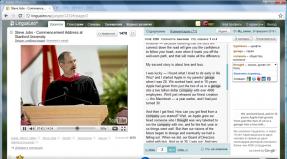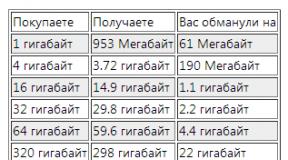What happens if you read it out loud. Reading aloud. How to read aloud
When was the last time you read aloud?
Why do people bad at reading aloud? Why is this happening? Why does it seem: “Now, oh, how can I read it!”, But dry reading comes out? Let's think about this.
When was the last time you read aloud?
That was a long time ago?
In this article will be (detailed) reviewed causes for which people are bad at reading aloud, recommendations how to develop reading aloud, practical exercises that will help learn to read aloud well, both for yourself and for public speaking.
Reading aloud
As writes Wikipedia: Reading- a complex cognitive process of character decoding aimed at understanding the text.
When we read aloud? Probably more.
And what comes out as a result?
monotonous reading. Inexpressive. Without the desired overflow of voice.
At least that's how it sounds from the outside.
Dear reader! A big request to click on the Google ad as a token of your gratitude to us for the free materials on this site:
What can be done to improve the quality of reading aloud?
It is useful to realize that the skill "reading aloud" we have not developed for a long time, but practiced reading “to ourselves”. And these are, although similar, but different skills of our brain.
After all, many texts are well written. They are carefully thought out by the writers. They contain words that are little used in everyday life, words that are useful for developing vocabulary.
How to sight-read in front of an audience
Have you ever seen a speaker reading from a piece of paper? Agree - a sad sight.
- and subscribe to our YouTube channel
Remember, for example, the speeches of Leonid Ilyich Brezhnev.
However, it happens that modern speakers who read speeches very well.
Why don't good speakers read from the sheet? - They are reading. And how they read.
Remember Altov, Zhvanetsky, and other pop comedians. Read, and read very well from the sheet.
Even Barack Obama often speaks while looking at a piece of paper.
But he reads in such a way that no one notices reading.
Here, for example, is one of the videos where Barack Obama speaks using written text. But it does look beautiful. Why? Because he can read.
- and subscribe to our YouTube channel. There are many interesting videos.
What should have been done? There are two options:
- Read - and "in your own words" to tell this text to the public.
- Learn the technique of "public reading".
public reading
Proper Public Reading.
Why “correct” - because there is a rule: you need to look into the eyes of those people to whom the speech is addressed, no matter whether it is written or not.
 Public reading (reading in front of an audience) is indeed more difficult than ordinary speech, and requires special skills.
Public reading (reading in front of an audience) is indeed more difficult than ordinary speech, and requires special skills.
Why is it more difficult? Because, as with any public speaking, eye contact with the audience is important here, and during sight reading it is difficult to create, and even more so, maintain this contact.
And not only see, but also feel how well the audience accepts and assimilates your material.
To see, to feel, whether my dear listeners understood the previous words.
Often, very often, the speaker does not notice how quickly he overloads the listeners' perception.
Let's remember our wonderful lectures at the institute...
What we pay attention to: pauses, eye contact and the speed of our speech. At what speed can you read aloud? I suppose it will be fast, but we need it in such a way that every word of yours is perceived by the audience.
An important technique: read while you pause, and when you speak, look into the audience. And so alternately.
You need to adjust the speed of speech, the duration of pauses and phrases. All this is achieved through exercise.
Exercises
How to read aloud correctly
So, let's summarize everything written above.
1. Not a problem.
If you (or someone else) are bad at reading aloud, this is not a problem. This - a task. You need to start reading aloud, and this skill will quickly develop.
And, very quickly. You just need to start doing it.
How to increase vocabulary is written in great detail here:
How to increase vocabulary
2. What to read aloud
- Recommend these
- And this is a whole site of good parables
3. How to read aloud
Yes. Exactly. Doubt? And you are doing the right thing. After all, there are many recommendations on the Internet where it is recommended to read at a speed of “120 words per minute”. But I am a public speaking coach, I know what I recommend.
With a normal reading speed, there is no time to pay attention to pauses, intonations, gestures, facial expressions. At this speed, 120 or more, the brain only has time to read.
And when to memorize words?
At this speed (120 words per minute), you can only read by looking at the text. But after all, you need to look not at the text, but directly, at the listener or listeners, or at yourself in the mirror.
- This is described in detail in my book "Mistakes of Speakers":.
4. By reading aloud slowly, you will be able to read beautifully.
Try to make the phrases different: something louder, something quieter, something faster, something measured, stretching the sounds, something intonation higher or lower.
By reading slowly, you can have time to switch emotions, and admire them in the mirror.
5. Practice reading aloud to yourself first.
Many people admit that they forget most of what they read, no matter how much they liked the text. When reading, we use our visual pathways to form memory connections. We remember stuff because it was what we saw. People who have a photographic memory are extraordinarily good. For the rest of us, relying on visual memory alone can leave a lot of gaps, and so we must find other ways to remember things. By reading aloud, we form auditory connections in our memory pathways. We remember how we said it out loud, and therefore we form not only visual, but also auditory connections.
Art Markman writes on his Psychology Today blog about the production effect, which explains why it is reading aloud that makes us remember better. Specifically referring to a study in which students were given a list and asked to read half of it aloud and half of it silently. The students were able to remember the part of the list they read aloud much better than the part of the list they read to themselves. He adds that there are memory pathways of seeing words visually, as well as auditory pathways of hearing words, there is also a memory linkage of the actual pronunciation of words, hence the production effect. Especially if the word or content is different, it makes it easier to remember.
However, keep in mind that simply reading the entire textbook before the exam will most likely not do anything for you. Why is this? This is because simply reading without categorizing, asking questions, and making connections does nothing to remember the material in your mind. You will not be able to fix in your memory what you have read. Also, you don't understand what you're reading. You just need it for the exam and then forget about it.
Half of the reader's brain is focused on pronunciation when they read aloud. Some people will read with great skill, while others will try to understand the meaning. If half of the brain thinks about the meaning of the text, then it will not be able to make every effort to pronounce it. When we read aloud, we must think and pronounce every word in the text. But there are many words that we do not need to pronounce and or understand. When we read silently, we may simply skip them, which we think is too difficult or not important.
Reading aloud is a great tool to help you learn to read correctly and build the skills of continuity and confidence. This will not only help you understand what you are reading, but will also allow you to listen to your voice.
- helps to improve diction and expression;
improves visual memory and the ability to remember images in your mind;
- improves spelling;
is a great exercise you can do to improve your own writing and speaking. This is a great practice for public speaking, theater acting speeches.
Benefits of reading your own text aloud
After you've finished writing something—whether it's a letter, essay, short story, book, or report—the best and most efficient text editing process is to read your work aloud to yourself. Here's how it works:
When reading your work aloud, you may hear grammatical errors.
- Recognize correct punctuation. For example, if you are pausing in your oral reading, you may need to insert a comma at that point or complete the sentence;
- when you read your work out loud and start to get bored, you probably need to cut back on what you wrote. If part of your text is less clear, you need to rewrite it.
When you read aloud, you fully communicate between your mind and your voice, which results in greater concentration. When you read to yourself in your head, you hear only the inner words. Their influence on you is limited to how you interpret them. If you choose to read them aloud, you may find a deeper meaning in the words.
People learn in a variety of ways, visual, auditory, tactile, and so on. By reading aloud, you will be more likely to absorb and understand the words of the text. Finally, such reading will make you more aware of the things you read and hear. This skill does a lot to shape your interpretation.
However, it has been suggested that reading aloud helps you understand more of the text you read. The parts of the brain that control speech are activated when reading aloud. This can help those who rely on auditory memory to help remember key things.
Another disadvantage of reading aloud is that it doesn't really appeal to people. Many students find it takes them away from their own understanding to listen to another person reading the text aloud.
A person can read faster by looking at the whole text rather than individual words. Reading aloud focuses on pronunciation, so readers tend to focus on every word and even every letter. This greatly slows down their work. And there are some words in the text that are not critical to his understanding. These include links to words and articles.
In our practical life, we mostly read silently. What do we do in a cafe or restaurant? We study the menu in silence. We read a lot of instructions in transport, hospitals and in various public places. We do it naturally. What for? We don't want to disturb our neighbors. We just want to know the message from the written words. This kind of reading helps us to read faster. As far as comprehension is concerned, such a process offers the opportunity to reread certain sections of the text if necessary. This helps us connect words faster. Silence helps us focus and process information. When we read to ourselves, we can form mental pictures of the topic we have read.
In general, any reading has its advantages. However, reading the text silently allows the person to read faster, and allows the text to be reread when needed. Whether a person knows more by reading aloud or silently is unknown and probably depends on their learning.
Perhaps the best form of introducing a child to a book can be family reading aloud. Immediately, we note that organizing this turns out to be a rather laborious task. You need patience, even extraordinary endurance, to read aloud from evening to evening, and yet you need to read, read a lot, forming in the unhurried process of this reading both the mind and soul of the child, establishing a strong spiritual contact with him.
It often happens that books were read to a child before school, but they stop reading to a first-grader at the very time when he, at the very least, has mastered reading and writing. And what? The child's appetite for books is waning. This is understandable. Reading for a six-year-old or seven-year-old person is still a complex process, technical difficulties prevent the child from absorbing the fullness of the information. It is difficult for him to read, uninteresting, boring. Parents who understand this read books aloud with their children in turn.
Here is what Nikolai Nikolaevich Zavalishin, the protagonist of I. Grekova’s novel “Chair,” recalls about his father, whose prototype, by the way, was the writer’s father: “In our family, reading aloud was a ritual, a holiday. For years in a row, every evening, before going to bed, when we children ... lay in our beds, the most important thing began: Pulin came and read aloud to us. He read magnificently, artistically, but not as a professional reader (I can't stand such people), but as an intermediary, an interpreter, acquainting his dearest ones with the most dear to himself. His beautiful, rather low voice changed, moving from role to role, from line to line. It was as if he was showing us a precious stone, turning it with different faces and admiring its caviar ... We didn’t hear anything in his reading! All of Gogol from "Evenings on a Farm" to "Dead Souls", including the second part (it was read in fragments), after which we were told the tragic story of the burning of the manuscript (I still can't forget the pain I experienced then!). Tolstoy: "Childhood" and "Adolescence", "Sevastopol Stories", "War and Peace". Dostoevsky: "Notes from the Dead House", "Crime and Punishment", "The Brothers Karamazov" ... And Goncharov, Turgenev, Pomyalovsky, Leskov! You can't even count! Now I understand what a titanic work it was: to read all the Russian classics to your children! And not only Russian: there were also Mark Twain, and Dickens, and Hugo, and Conan Doyle…”.
What are the best books to read aloud? First of all, ask yourself: what attracted you in childhood, adolescence, youth? Read to your child everything that you consider appropriate, interesting, everything that you liked to read yourself at the same age. It is especially important to choose such classical works that, when reading independently, reading to themselves, children cannot immediately appreciate, they will call them boring. If, for example, you read aloud N.V. Gogol's story "The Old World Landowners", the listener will remember for a long time the magnificent description of the life of two old people, filled with care for each other. Reading aloud is always attentive reading, when every detail is given its due, details, when not only the meanings of words are assimilated, but also the shade of meanings. The slow pace of the presentation of information when reading aloud makes the vision of everything depicted in the work more accurate and complete. N.V. Gogol came up with the idea that only a clear reading can give a clear meaning. But it's not just the visibility of the details. Our intonation is very important, the most natural, our comment (without edification!), Our assessment. It is good if children ask us what this or that word means. By revealing to the child its meaning, we give him this word, as it were, and thus nourish his thinking.
Sometimes parents in the process of family reading, as it were, put on the toga of teachers and immediately ask questions: “Did you like it? Why? Retell! After reading the book, it is better to ask questions carefully, tactfully. Let the child ask you himself, be interested in your opinion, let him not rush to condemn the book if it seemed uninteresting to him, in short - let him think ... As for "boring" books, the rule should be quite strict: if the book is started, it should be read to end, especially since the assessment of the book by the end of reading may change to the opposite. “Unfinished books, like half-eaten pieces on a plate, spoil people's character,” we read in M. Shahinyan.
The older the children, the more difficulties arise with the choice of books. This also applies to the process of independent reading. The position of parents in this matter is different. Here is a curious excerpt from the memoirs of Vadim Shefner: “Mother demanded that I not read until night, but she did not impose other prohibitions in this sense and allowed me to read anything: she believed that there were incomparably more good writers in the world than bad ones, and that good books themselves will overcome bad books in my head; if you keep the boy in blinders and from the outside determine for him what he can read and what he cannot, then he may lose interest in the printed word ... "
And here is a different approach. Doctor A. Andreev recalls his father: “He guided our reading. And if we took an empty book, then he simply remained silent, did not want to talk about it - this silence was his review. Note: in both the first and second cases, the parents avoided sharp, categorical judgments, did not express them openly to their children, showed tact, and, perhaps, this tact not only preserved and protected interest in reading, but also stimulated the desire to figure it out, to understand , estimate.
The root of the problem is how to read? It is reading aloud that can develop the habit of reading attentively, richly. The ability to evaluate a book also develops through reading and group discussion. And what a brilliant opportunity this is for parents to talk to their child, no matter how old they are! Each book is worth reading as a textbook, which is sure to teach you something, most likely imperceptibly. You can even disagree with the author if the book is not accepted by the heart, argue, defend your own - all this is also useful and interesting.
Is it necessary to adhere to the unity of topics when choosing books, will the genre diversity of what is read to the child hurt? These questions, although they concern many parents, seem far-fetched to us. Reading aloud (and not only aloud) should be quite diverse both in terms of topics and genres of works of art.
It is useful to listen to the requests of children in choosing a book. Many children like to return to familiar books. Do not be lazy to read the book a second, third, fourth time. This means that it is important for the baby, since he asks to repeat the reading. The motives for such requests may not be very clear to adults. One girl, when she fell ill, asked her mother to read to her "The Adventures of Dunno and His Friends" by N. Nosov. In total, the book has been read seven times. Apparently, the meeting with Dunno, the anticipation of familiar events helped the young listener to cope with the illness.
A talented teacher knows well the value of repeated reading. V. A. Sukhomlinsky tells how the cult of the book was created in his school: “Yes, the new, the unknown must also be read, and we read new books. But a work enters the spiritual world only when the child wants to read to his comrades what excited his heart, he wants to convey his feelings and experiences in words. We read each book from the first section of our library aloud at least 10 times, and interest in it did not weaken from repeated reading. The book was read 2-3 weeks ago, but the children do not forget it, they strive to read it again and come to school especially for this. 3-4 months pass, the children again want to read their favorite book - again collective reading is dedicated to it.
If your son's or daughter's school has an expressive reading club, encourage your child to take that class. One of the most useful activities - expressive reading - will help your child penetrate the depths of his native word.
Reading aloud in the family... With a variety of technological advances, dad's, mom's or grandma's reading aloud can seem old-fashioned and ineffective. However, let's not rush to conclusions. The Personality is still created by the Personality, and to encourage a young person to love books, to communicate with his child, to help him understand life - is there a more important and necessary task for us? I think no.
1. School performance is 95% dependent on the child's ability to read aloud not in syllables, but as if he were just telling something. In schools, children are not taught to read well (fluently and expressively), but they are transferred to “silent” reading (with eyes similar to superficial reading - “speed reading”).
The school curriculum is designed to teach the rules of grammar and separate reading of words, and for effective learning of any skills or academic subjects, you must be able to read aloud with high quality. Humanity has not come up with anything more useful for the development and prevention of brain degradation.
The main “problem” that makes it difficult to understand the importance of “loud” reading is that when you start reading aloud, the information is not absorbed. In fact, the situation is exactly the opposite. With "silent" it flies into one eye, and flies out into the other. The brain just doesn't understand it right away.
2. Expansion of vocabulary. It's no secret that even an ordinary adult's vocabulary in his native language practically does not increase if he does not perform special exercises. What can I say about the rapid study of a foreign language or the development of a new specialty - it requires the assimilation of too much new information!
Meanwhile, it is reading aloud that has a powerful synergistic effect from the interaction of different parts of the brain at the time of reading aloud: the visual, auditory and motor parts work simultaneously. The more diverse sources of information, the faster and more accurately the details are remembered.
3. Reading with takes in a different manner is the perfect way to learn poetry or song lyrics.
Memory works on the principle that everything that is not repeated is forgotten. Therefore, it is important to do doubles or, more simply, to repeat. At the same time, it is simply necessary to introduce variety into the process. The more possible options for losing a situation, the better it is remembered.
4. Loud, expressive, emotional reading aloud is one of the most effective exercises for the development of children's speech. However, not only children, but also adults! Why exactly aloud, and not as usual - with the eyes, "silent"? It is reading aloud that provides speech training, language practice, while “silent” provides only a superficial assimilation of any information by the brain. To become a dancer you need to dance, not to watch how others do it.
When reading to oneself, the main part of the information is perceived by the brain as "garbage", unnecessary and is quickly erased or stored in places inaccessible for reproduction.
5. Psychologists are sure that reading is the main process that contributes to the formation of personality at all stages. From the cradle, when the child hears the voices of parents reading aloud to him, and in adulthood, when a person overcomes various crises and grows spiritually. It is difficult to overestimate the benefits of reading for teenagers. Reading - at least sometimes - aloud, adolescents not only seriously improve memory, thinking and develop other cognitive processes, they learn to love, evaluate actions, empathize, trace cause-and-effect relationships between any events, analyze actions, forgive, etc. The most effective reading "adult" books, especially the works of Russian classics, for example, F.M. Dostoevsky. Without reading it is impossible to form a harmonious person.
6. From the point of view of evolution, the ability to read is a clear superstructure on the already existing structures of the brain. It turns out that most of the higher areas of the brain are involved in reading. So reading can be seen as The best exercise to keep your brain in shape…
The brain of a person who can read works in a markedly more complex way than the brain of an illiterate person. Moreover, the brain of a person who practiced reading in childhood is better able to activate all its resources than the brain of a person who learned to read and write as an adult. We can boldly say: reading is one of the best exercises to keep fit the whole brain. This is all the more important, given that such competitors to reading as “educational” computer games have shown themselves to be very dubious “trainers for the mind”.
Another important corollary of the results of the study: difficulties in learning to read and write are natural. If a child (and even more so an adult) cannot easily master this seemingly ordinary type of activity, then now it should be remembered that what seems elementary outwardly is actually one of the most complex tasks that the human brain can only solve ...
General conclusion: a constant reading exercise not only improves this very reading and, for example, broadens one's horizons, but also increases the efficiency of the brain in almost all areas of human activity ...
7. Speed Reading or Slow Reading? Speed reading is a special form of reading that should not be abused. Speed reading can be useful for finding the necessary information in a large stream. The brain consumes less energy with this type of reading and there is a great danger in this. You can get used to reading everything in this mode and then expect trouble. Artistic text will fly by unnoticed, and your speech will "jump" from topic to topic, bypassing logical connections.
8. Will “loud” reading help get rid of an accent or serious speech defects? Yes, definitely. The most powerful tool for correcting speech defects, such as, for example, burr, stuttering, booming voice, “collective farm” regional or foreign accent, is parallel (simultaneous) reading with “word masters”. Defects are eliminated quickly and effectively if you try to accurately imitate all the vocal characteristics of the "reference speaker". Not so long ago, Mikhail Shestov created special correspondence courses that provide both children and adults with a free entry into the “harmony of the language”. That is, they make it possible in a few hours to learn how to read the most complex texts with actors, even for intelligent adults.
9. Impact on writing literacy - quantity can turn into quality. Of course, for the development of literacy writing, it is necessary to rewrite literate texts, but even simple reading aloud can improve writing style. Beautiful phrases are constantly “rotating” in my head, which you can add to the text at any time. And the more such phrases, the more interesting your notes become. You clearly understand the correct word order and are able to build beautiful sentences, even with small spelling or stylistic errors.
Advice from Mikhail Shestov: It is very good to memorize by pretending to be different characters and assigning them different voices and manners of speaking. Even if you are just reading a book alone - read it as if you want to interest a child. This manner of memorization becomes like a fun game, not boring cramming.
When and how to start teaching a child to read aloud?
With a child from birth, you need to speak the correct Russian language, expressively, dramatically and emotionally. And as he grows older, it is necessary, as soon as possible, to teach him to expressively read aloud using three types of training:
- repetition after the announcer (after you, for example)
- reading with the speaker
- independent reading
Definitely - listen! With the help of these exercises, it is imperative to accelerate the speed of reading or repeating after the speaker to the speed of fluent speech of adult native speakers. Learning to read according to the model should begin at the age of three.
One of the most important exercises for the development of normal intelligence is the development of spelling - the art of freely decomposing words into letters, singing them out loud. And with ease to make separate words from sequences of letters.
Any lessons do not need to be crammed, you need to be able to read them expressively and aloud, in a different manner, with different volume, as if making duplicates (like actors and singers). All unfamiliar and incomprehensible words must be looked for in the explanatory dictionary, spelled out and read aloud their interpretation. It is necessary to learn to work with a dictionary and various encyclopedic literature from the moment when the child learns to read.
To expand horizons
To broaden horizons, you need to force the child to read aloud and rewrite smart texts in large enough volumes: from five standard pages in a row. This, very quickly, will develop in him the habit of doing this on a daily basis. You will need a selection of texts written by smart (highly educated, very literate) people, including various quotes and sayings, as well as just texts that reveal (present) the diversity of styles of the Russian language. The meaning of all unfamiliar words should be searched for in a regular or electronic explanatory dictionary, pronounced and spelled out. The maximum amount of such work with the dictionary is one standard dictionary column per day.
It is also required to quickly, using stencils, to ensure the formation of calligraphic handwriting or a computer keyboard, to teach the child the error-free tracing of individual words and sentences, and, in the future, to take dictation. Which, in turn, will lead to the formation of the ability to write independently.
Is an improvement in diction. Exercises to improve diction allow you to learn to clearly pronounce words, sounds and phrases. The quality of diction and the purity of the sound of speech can be compared to handwriting - bad handwriting is difficult to decipher, and a person with poor diction is difficult to understand.
Diction is responsible mainly for the pronunciation of consonant sounds, while the purity of sound is given away from vowel sounds. The sound stream of vowels undergoes final processing with consonants, in order to be then transmitted to listeners.
Consonant sounds carry the main information load. This is easy to verify if you take out all the vowels from the text, and then try to read what happens. Kk prvl, tky tkst V sm prchtt bz sbh prblm . Now try leaving only vowels: a aio ao e s oee oia e ooo o “You are unlikely to understand anything.
Fast reading aloud
Reading aloud is one of the best exercises for improving diction. The articulation is harmful, and deliberately suppressed. Here, on the contrary, it is welcome. In diction exercises, we have other goals - to improve our speech.
In addition to improving diction, reading aloud also teaches you to express your thoughts easily and accurately, helps to increase your vocabulary, improves the brightness, emotionality and correctness of speech.
Reading aloud allows you to get rid of tongue-tied tongue, hesitation, reservations and other unpleasant things. Literary texts are usually more complex and better than our everyday speech, and even better than most speeches of speakers. Therefore, daily reading aloud will soon allow you to speak in a beautiful literary language, as if according to writing.
For starters, it's important not to rush. Always read at a pace that is comfortable for you, pronouncing the words clearly. If at first you can’t pronounce the words clearly, don’t be discouraged. A little practice and you will have excellent diction. Read aloud expressively, emotionally, with stress and pauses.
You can even slightly exaggerate emotionality, add a little pathos. This will not hurt - the main thing is that you do not read aloud dull and pale.
Artistry is a good quality. When voicing characters, give them individual traits. State the text from the author not as a boring monologue, but as if you are expressing your thoughts, or telling about what happened to you.
Everything can be read , anything, but it is best to read well-written materials containing useful information and rich vocabulary. It can be informative articles, stories, novels, poems, scientific and technical texts. You can combine learning with reading aloud - in this case, your studies will have a double benefit.
When you feel confident enough, you can gradually increase your reading speed. It is important not to lose the clarity, clarity, emotionality and beauty of the presentation of the material.
To read text aloud quickly and without hesitation, you will have to learn how to skim through it at a fast pace in advance. By practicing in this way, you will soon be able to snatch out entire paragraphs, and then read them beautifully aloud, half from memory.
Read aloud at least half an hour a day . Literally after a month of such exercises, you will notice the results - improved diction, smoother and more correct speech, a larger vocabulary, wit and resourcefulness in answering listeners' questions.
It will be very good if you record your speech in audio before starting classes - after some time it will be interesting for you to return to the recordings. and check your progress.
Main Rule when reading aloud - a clear articulation of consonants, and a free exit of air on vowels. Figuratively speaking, vowel sounds should be pronounced like a mouthpiece, and consonants should be clearly articulated. Do not strain your vocal cords, and speak with some kind of anguish, from which you can only break your voice.
Hear what he says TV announcer . He must give out a lot of information in a short time, and at the same time present it in such a way that he is understood. Therefore, the faster the speaker speaks, the clearer his speech should be. Use this rule in your speech as well.
Tongue Twisters
 In addition to quickly reading fiction and technical literature, you can use tongue twisters to improve diction. On the Internet you can find a huge number of them. Tongue twisters are used by TV presenters, actors, politicians. You just need to use them correctly. The correct technology is as follows - at first you pronounce the tongue twister clearly and slowly, and then repeat, gradually increasing the pace.
In addition to quickly reading fiction and technical literature, you can use tongue twisters to improve diction. On the Internet you can find a huge number of them. Tongue twisters are used by TV presenters, actors, politicians. You just need to use them correctly. The correct technology is as follows - at first you pronounce the tongue twister clearly and slowly, and then repeat, gradually increasing the pace.
When increasing the speed, care must be taken to ensure that the clarity and fluency of speech does not deteriorate.
It is also important to learn how to pronounce tongue twisters with different intonations: admiration, surprise, joy, reflection.
You can get more detailed information in the sections "All courses" and "Utility", which can be accessed through the top menu of the site. In these sections, the articles are grouped by subject into blocks containing the most detailed (as far as possible) information on various topics.
You can also subscribe to the blog, and learn about all the new articles.
It does not take much time. Just click the link below:



















